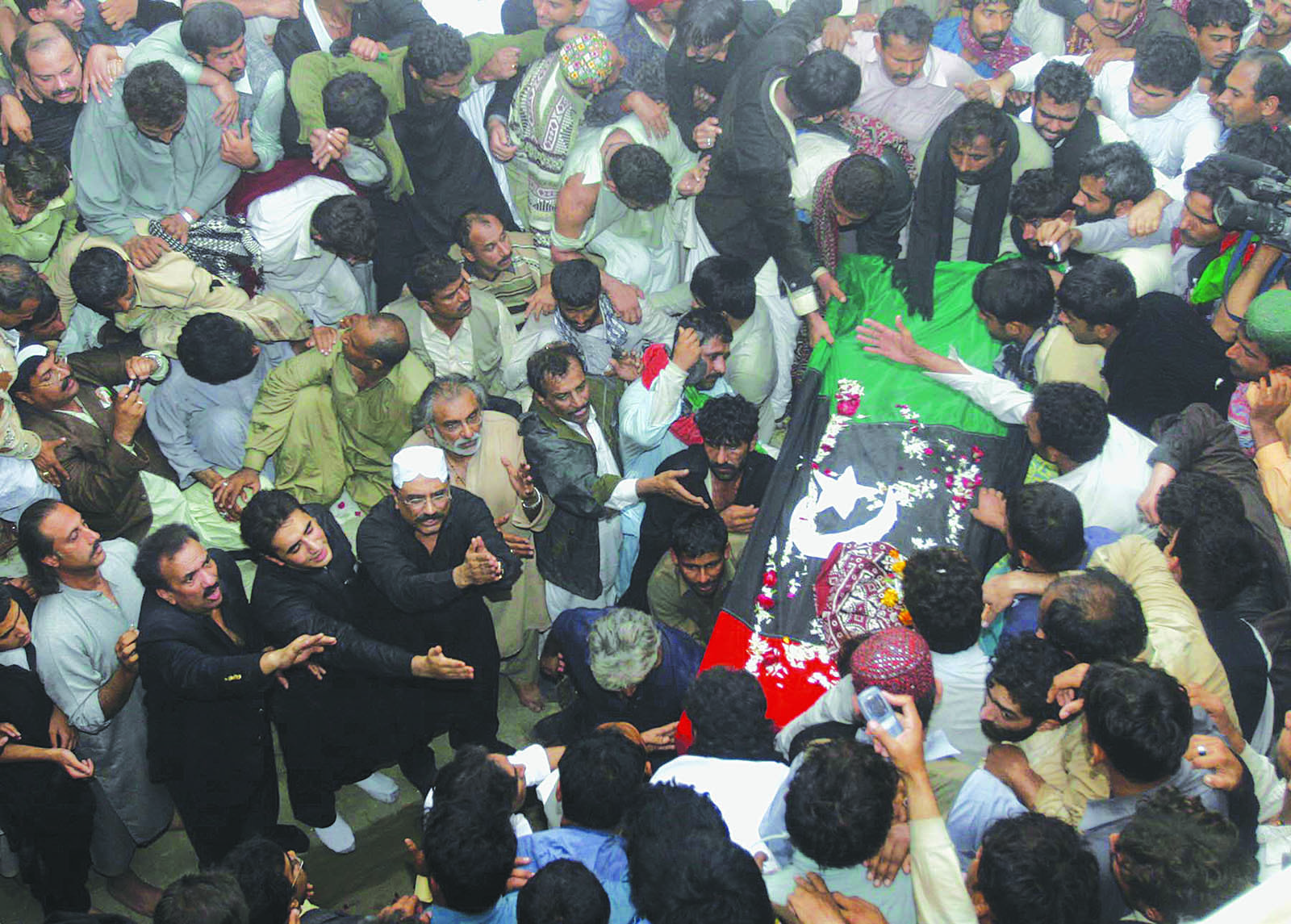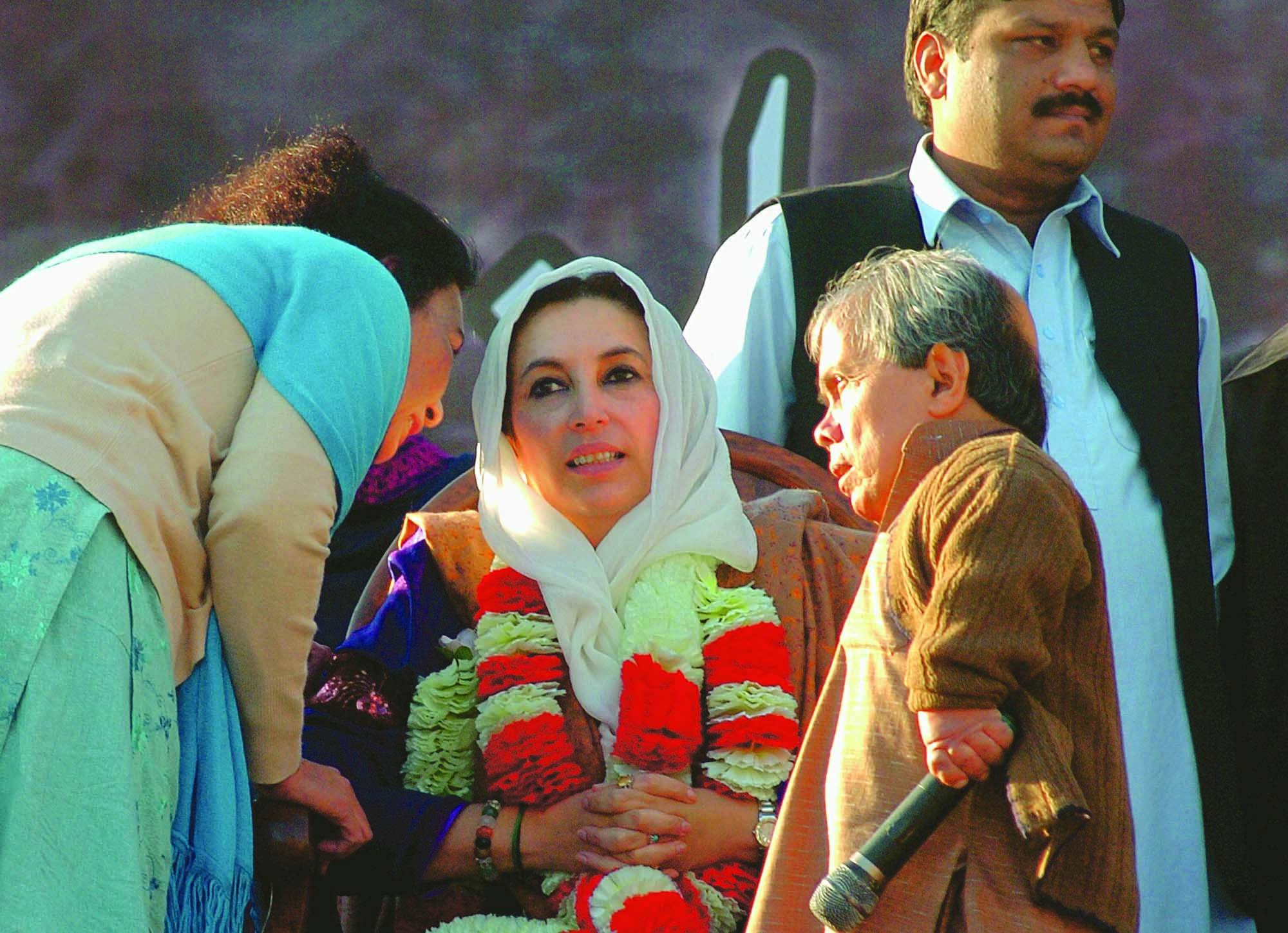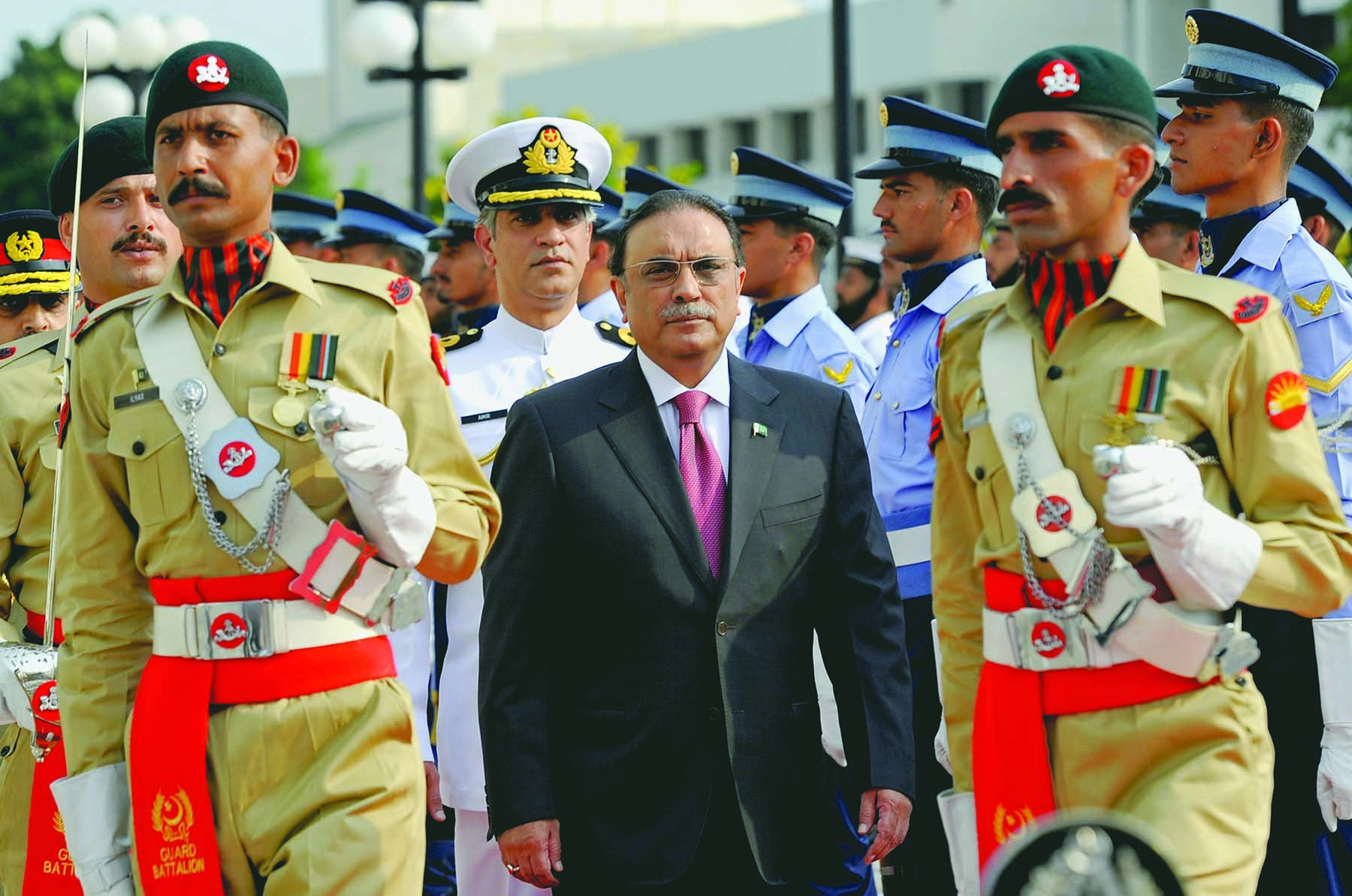ldrees Bakhtiar and Hasan Iqbal Jafri
Updated 25 Apr, 2019 12:58am

It was 9:05 p.m. on June 5 when Mir Murtaza Bhutto stepped out of the District East Jail. As his Land Cruiser appeared before a restless crowd of over 2000, the only surviving son of Zulfikar Ali Bhutto waved his fist in the air in jubilation. After seven months of imprisonment and 16 years of exile, Murtaza Bhutto was finally free.
However, just as his return from exile and subsequent arrest last year had unleashed a flood of controversy, Murtaza’s recent release has provoked a fresh bout of intense speculation. Within 24 hours of his release, Murtaza Bhutto launched a blistering attack on his sister and brother-in-law. He called Asif Zardari and his friends, “Asif baba and 40 thieves,” and alleged that Zardari and his “cronies” were siphoning off billions of rupees in shady deals. He then went as far as to suggest that his sister’s government should be replaced with a “national government for five years”.
The Bhuttos have always been a controversial lot, but Murtaza is fast becoming the most controversial of them all …
It is becoming increasingly clear that Murtaza does not want to share power with his sister. It is also becoming apparent that the Pakistan People’s Party is heading towards some kind of a split. This division may not be as serious as the split within the Muslim League, but many political pundits are predicting that before long there will be two PPPs – one led by Benazir Bhutto and the other faction by her brother.
Murtaza’s comments on the army’s role in politics has also caused several eyebrows to be raised and many see his comments as an indication that Murtaza desires a reconciliation with the people whom he struggled against for the last 16 years.
In an exclusive interview with the Herald, Bhutto maps out his plans for the future of Pakistan and the Pakistan People’s Party and spells out his differences with the prime minister …
Herald. Are you or are you not a member of the Pakistan People’s Party?
Murtaza Bhutto. We formed the Shaheed Bhutto Committee for the purpose of getting a single election symbol, since I was running as an independent candidate and the party had not given me a ticket. I am a char anna member of the PPP and an older member of the party than Benazir.
Herald. In your last interview to the Herald you said there were no differences between you and your sister. But in your recent press conference you publicly accused Asif Zardari of corruption. Why have you changed your mind on this issue?
Bhutto. Earlier, there were constant questions as to whether there were any differences between me and Zardari. There were no personal differences. I had only met him twice and had not developed any relationship with him. But as events occurred, I realised to what extent he and his group have hijacked the party. That is when political differences arose. We do not want cronies, we want democracy in the party. We felt that the party had gone through a long struggle and many deserving people were not given tickets for the October elections.
Those who had struggled for the party deserved to sit in the assembly. But they were superseded by Zardari ‘s cronies. Party funds were usurped, these had to be accounted for. These political differences became more pronounced as time passed.

Herald. Do these differences with Zardari translate into differences with Benazir?
Bhutto. I am finding it more and more difficult to differentiate between the two. Either she wholeheartedly endorses the misdeeds going on within party ranks or she does not have a say in running the party. In either case, she has made herself the chairperson of the party, she has to take the ultimate blame and responsibility.
Herald. You say you are with the party that Zulfikar Ali Bhutto founded. Could you elaborate what that means?
Bhutto. The party that has emerged now has no resemblance to the party that Zulfikar Ali Bhutto founded, neither in principle nor in politics. The party ideology has been watered down. All sorts of adventurers and muckrakers have been brought into its ranks.
Old faithfuls have been sidelined. Policies are made in an arbritary manner. Forget that, the Karachi PPP’s president has been complaining that policies have been made without consulting him. The whole country’s policies have been formulated without any consultation. They have been decided by Mohtarma and a few of her cronies. This is not the way a modern democratic government functions.
Herald. But which party will you be working with?
Bhutto. I am with the PPP which has been mutilated by the people who have hijacked the party. We will reform this party and bring it in line with the party that Shaheed Bhutto founded.
Herald. Do you mean with the same type of ideology or the same type of people?
Bhutto. Ideology matters to us. Ideology is not a fashion. Roti, kapra aur makan is not out of fashion. At best you can progress beyond that stage. But our basic needs are not being fulfilled. In America, there was the debate of two chickens in a pot and two cars in every garage. Perhaps we could reach that stage.
I have not been in the country, but intuitively, I could tell that the basic needs of the people were not being met. Perhaps if Shaheed Bhutto was alive he would have said that roti, kapra aur makan, and now water, are important. You talk about a social revolution, pie in the sky theories and abstract notions. We have not crossed the stage of roti, kapra aur makan. In fact we have fallen behind. Our infrastructure is falling apart.
Herald. How do you intend to reform the party when the CEC is the decision making body …
Bhutto. Where does the CEC come from? Yaari dosti main to nahi banti. We will go to the people, we will give them a programme. We will start a face to face contact with the people after Moharram. We will hold elections and there will be a membership drive from the ward and unit level to the CEC level. It will take some time.
Herald. You said in August that you will announce a socioeconomic package and that it was ready. What is the delay?
Bhutto. We have announced this many times. We have not put it in the form of a manifesto which we don’t think is necessary. But if it were to be committed to paper, it could be done in a few hours. We have stressed on the development of infrastructure rather than silly things like social contract because the infrastructure has completely collapsed.
Whatever was made 30 or 40 years ago is falling apart. We have stressed things like developing chicken farms, fisheries, increasing production by drip irrigation which has been successful in countries like Libya and Israel. We have stressed basic development and then we can talk about motorways, bullet trains and mass transit systems.
Herald. Do you have any personal differences with your sister over the family inheritance?
Bhutto. No not at all. The PM said that my mother will go to Switzerland for the Davos Conference. Immediately people said, ha! what does Switzerland have – chocolates and secret accounts. The impression was that there was this horde of gold or billions of dollars stashed there. There is nothing like that. My father had already distributed his property between us and our income is from agriculture. There is no dispute.

Herald. You said earlier that you have nothing to do with the PPP. That was taken by many as an indication that you are going your separate way.
Bhutto. At that stage our situation was different. Even now I am an independent member of the Sindh Assembly. They (PPP leaders) just didn’t want to give me a ticket. Each time they would choose some character and say vote for him because this seat is Murtaza Bhutto’s amanat. If it is Murtaza Bhutto’s amanat, at least consult Murtaza Bhutto.
They used a dual policy of threats and guilt. They said, “if you return, there are many cases against you. We will not be able to protect you.” The second tactic was guilt: “If you come home my government will fall. My struggle, my sacrifice, my jail, and house imprisonments will go to waste, now when we have a chance to serve the people.”
So I said serve the people.
Herald. But can you deny that Benazir has gone through a great deal of suffering?
Bhutto. I am not discrediting her. I am not at all belittling her role. She played a heroic role.
That’s why I agreed not to return. She said, if you come back we will forfeit the chance of serving the people. Then I thought, is my personal comfort or discomfort not important at all? How long should I stay out of the country? She said ‘when we can call you, we will call you.’ They wanted to dust me under the rug, that is what the policy was.
The main thing is that they entered into an alliance with the MQM, and the MOM goes on a rampage and massacres people. There were 212 private criminal cases filed against the MQM. And when the MQM said that they will withdraw their support, the government, with one stroke of the pen, withdrew all the cases. Then I realised that it is not my interest that they are looking out for. They are afraid for their own powers.
As I said Benazir underwent a heroic struggle. She was sent to prison in Sukkur and in Karachi, but the rest of the time was spent in this house (70 Clifton) and in AI Murtaza which is not exactly lacking in luxury – it is quite comfortable.
The ideal situation would be that Benazir remains unchallenged in party affairs. They can tango and cross horns with Nawaz Sharif till the end of the world. As long as I stay in Syria, I should not return to the country.
Herald. You stated very confidently that the government would not last beyond December? What lies behind this confidence?
Bhutto. I don’t see the government as staying beyond December. The rot has set in. When the decline comes, it is a Herculean task to reverse the rot and change things.
Herald. Since you are so confident that Benazir will not last beyond December, would you rather see Nawaz Sharif running the country?
Bhutto. No, they are both corrupt and inefficient.
Herald. Is that why you are pushing the “national government” line?
Bhutto. Absolutely. Benazir has come to power twice. The second time round her government is even more corrupt and inefficient. I don’t see any redeeming quality in Nawaz Sharif’s government either.
Herald. So where will the country find these honest people to head a national government?
Bhutto. In a country of 120 million people, I am sure they can find some people who can run the government efficiently and honestly for a full period of five years with the help of the establishment and the army. A caretaker [governement] cannot do anything.
Herald. Do you see yourself as part of this “national government?”
Bhutto. My decision to participate will depend on a·series of factors. Factors such as the agenda the government sets for itself, the timing as well as who the other members of the government are.
Herald. You have recently praised the role of the army in very glowing terms. How did you reach this verdict?
Bhutto. I praised the army’s nonintervention in politics.
Herald. Do you really believe that the army is not intervening in politics?
Bhutto. At least the army is not blatantly intervening in politics. At most our politicians are running to the army. They are dragging the army into politics.
Herald. During the recent strife, the army and the civilian government were taking decisions in consultation with each other. Who do you think is running this province?
Bhutto. The army has been given a constitutional role for this operation clean-up. I have been demanding that the operation should come to an end. Not that there is no problem, but the sooner it can be solved, the sooner the provincial government will learn to handle its affairs on its own. It would be better for the whole country.
Herald. You have just secured bail in a case in which you were charged by the navy, and the army too has lodged many cases against you. Why have you developed so much sympathy for an organisation that has been hounding you?
Herald. Because you have to differentiate between the army as an institution and martial law. When martial law was imposed in the country, we opposed it and will oppose it and continue to oppose it. But we do not oppose the institution of the army as such.
So, these cases were instituted by the martial law regime, these are not army cases. The Shahbander case was registered by the navy at the insistence of the interior ministry. It was Prime Minister Benazir Bhutto’s case against me. lt just happened to involve the navy.
I want to assure you that I am not backed by any intelligence agency nor do I seek any backing . I am not backed by the army, I only have regard for their professionalism.

Herald. So you are saying that as far as the army is concerned, their professionalism is admirable but their involvement, even covertly, in national politics is not acceptable?
Bhutto. I did not say that. If some things have become a fact of life because of 11 years of martial law … I am opposed to martial law. It has never served the national interest.
Herald. Some people have been of the view that your return to Pakistan, the cases against you and family dispute is nothing more than noora kushti?
Bhutto. Have you seen the World Wrestling Federation matches? That is noora kushti. Wrestlers will be slamming each other and beating each other up, but blood will not flow. In our case, blood was shed on the streets of Larkana. Once blood is shed, you can be sure that this is no noora kushti.
Herald. But even after that incident, Begum Nusrat Bhutto was sitting comfortably with Benazir Bhutto. The differences between them seemed to have fizzled out?
Bhutto. You will have to ask her about that. I was opposed to any kind of contact like this. Many efforts were made to establish contact. First it was done at the children’s level. My children were invited to birthday parties. But they are cousins, I don’t want to continue this conflict to the next generation.
But at the same time I don’t want to confuse my supporters either. It sends wrong signals. If Benazir wants to meet me, she has to come up with a serious political agenda.
Herald. I am slightly confused on one issue. You have said that there will be reforms within the party starting with the elections?
Bhutto. We will have a mass contact drive and then elections.
Herald. Who do you think you can trust amongst the present PPP leadership?
Bhutto. I trust all the people who are with us.
Herald. Who can you not trust?
Bhutto. In the false PPP, the most prominent minister is the one without a portfolio. He has not even been declared a minister. He runs the finance ministry, the interior ministry, home ministry and the province of Sindh. Hamara chief minister bhi to Islamabad mein hai!
Herald. So in the end, you are saying that you will form another party?
Bhutto. No, no, We are reforming the Pakistan Peoples Party.
Herald. But this would be a different PPP?
Bhutto. It will be different from the one which now holds power.
This article was published in the Herald’s June 1994 issue. To read more subscribe to the Herald in print.






